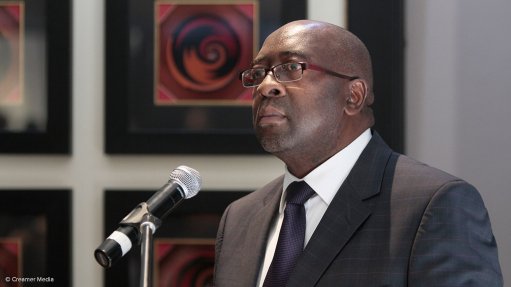
Finance Minister Nhlanhla Nene
Photo by: Duane Daws
Finance Minister Nhlanhla Nene gave a firm guarantee on Tuesday that the new Cabinet was fully behind the implementation of the National Development Plan (NDP) and even revealed that President Jacob Zuma was personally meeting with individual Ministers to seek assurances that their strategies and plans were aligned with the NDP.
Responding to a question posed by Nedbank chief economist Dennis Dykes about whether all his Cabinet colleagues were entirely committed to the business-friendly aspects of the NDP, Nene stressed implementation was already under way and there were also plans being developed to accelerate implementation.
Nene told attendees to the Thomson Reuters Economist of the Year event in Sandton that Zuma had, only the previous day, reminded him that “I’m next in line” for the assessment. “The President is sitting with each Ministry to see how their plans, which are encapsulated in the Medium-Term Strategic Framework, talk to the NDP.”
Government’s seriousness regarding the implementation of the NDP could also be seen in the appointment of Deputy President Cyril Ramaphosa as chairperson of the National Planning Commission and the “deployment of the most senior Minister in government, Minister Jeff Radebe” as the Minister in The Presidency overseeing planning, performance, monitoring and evaluation.
“So [the NDP] is being driven at the highest level,” Nene said, while acknowledging that the breakdown in trust between government, business and labour had impeded progress.
“Somebody said that we actually have a triple deficit: the current-account deficit, the fiscal deficit and the trust deficit,” Nene mused.
Priority, therefore, had to be given to “normalising” the labour environment, while also dealing with constraints, such as the electricity shortages.
But Nene did not join the chorus calling for an overhaul to the Labour Relations Act, saying he “shudders to think” what the labour climate would have been like had South Africa not had the current legislation that governed industrial and labour relations.
Government and business, which both employed labour, had the responsibility to understand the underlying causes of the current tensions so that these could be addressed. But Nene also appealed for disputes to be resolved more quickly, stressing that the protracted platinum-sector strike had undermined the performance of the economy.
Reference was also made to ‘Operation Phakisa’, which was modelled on Malaysia’s ‘Big Fast Results’ methodology, which Nene said should help government fast-track NDP delivery.
However, government would pursue these priorities while maintaining its commitment to fiscal consolidation. This would be achieved by shifting expenditure from consumption to investment and ensuring better value for money by “removing bells and whistles [and] stretching our rand”.
Nene said it would also be “stricter” in its demands on State-owned companies, particularly those seeking additional support. “What we have seen in the past is that we put in the money and you expect that it’s going to turnaround and you find yourself exactly where you were.”
This would require mechanisms that ensure that the turnaround strategies yielded the desired outcome, aided by the people that have the capacity to deliver on those strategies. “That is why all the State-owned companies will actually form part of the Big Fast Results we are talking about.”